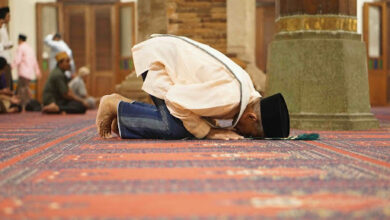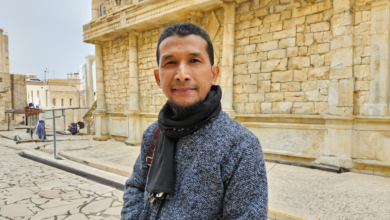
DDHK.ORG - Rasulullah saw's warning regarding the implementation of fasting:
- “How many people fast but they get nothing but hunger and thirst.
- "Whoever fasts and does not leave dirty speech, then Allah Almighty has no interest in fasting.
- Fasting is a trust, so keep that trust between you.
There are several indicators of our fast failing. Among them:
- People who are successful and are accepted by their fast will get the Ketaqwaan Cup. (QS. 2: 183). Have we been able to win the trophy all this time? Maybe not, because our fast failed!
- The virtue of a person who fasts successfully and is accepted by Allah SWT, his prayer will not be rejected. (Al-Hadith) Are there still our prayers and wishes that have not been answered? It could be that something is not fulfilled, because our fast failed!
- The virtue of those who fast will enter the doors of Ar-Royan in heaven. Are we worthy to enter? Maybe not, because our fast failed!
Why can we fail when fasting? It could be because of a practice error in fasting:
- Intention
- Refrain from breaking the fast, from dawn to sunset.
There are some mistakes that are common. Among them:
- One fast for 2 intentions (obligatory debt and sunnah).
- Relying on the call to prayer as a patrol for sahur and iftar times, not eternal prayer times.
- There is no right clock to indicate the time of eternal prayer.
- The procedure for paying debt is not in accordance with the provisions; whether fidyah, fasting, or plus kifarat.
Tips so that fasting is not rejected:
- Stick to the imsakiyah schedule to pay attention to the times of Fajr and Maghrib every day.
- Match the clock with the sun's circulation, call 103.
- Do not rely on the call to prayer as a patrol of the sahoor and breaking the fast.
- Pay attention to the Imsak time as a yellow light to prepare for the end of the meal.
The things that break the fast are divided into 3 parts:
- That invalidates the fast and the obligation to pay his qodhos outside the time of Ramadan. Among them, eating / drinking because they suspect that it is Maghrib, vomiting on purpose, intending to break the fast, and bleeding during menstruation and postpartum bleeding.
- That invalidates fasting and the obligation to pay qodho and kifarat. Namely, having sex during the day.
- Pay by fidyah. Namely, it applies to those who are pregnant, breastfeeding, and parents who are weak.
Myths surrounding things that break fasting:
- Tooth brush. The origin of the law is sunnah if it is perfunctory, it becomes makruh if it is excessive, and it is haram if it is finally swallowed.
- Shower / bath during the day.
- Blood donors.
Ramadan worship practices:
- Qs 2: 183 (shoum, to be devoted).
- Qs 2: 184 (sharing wealth).
- Qs 2: 185 (Al-Qur'an, to be grateful).
- Qs 2: 186 (Prayer and dhikr, for guidance).
Tarawih Fiqh in the month of Ramadan
His argument was made, as narrated by Abu Hurairah, that the Prophet said: "Whoever establishes night prayers in the month of Ramadan because of faith and seeks merit from Allah will be forgiven his past sins".
Implementation:
- Can be done either in congregation at the mosque or at home.
- It can be done in congregation or alone, because the Prophet sometimes performed the tarawih prayer in congregation in the mosque with his friends, sometimes alone at home.
- Performed after the Isha and ba'diyah prayers, either directly or postponed until before dawn.
- Performed without adhan and iqomah.
- The number of tarawih prayers may be 11 cycles, may be 23 cycles. The implementation can be done per 2 cycles or 4 cycles with one greeting.
Fiqh i'tikaf in the month of Ramadan
Definition: I'tikaf, namely, staying in a mosque with certain intentions and certain characteristics and conditions.
His argument is made: I'tikaf is a legacy since the time of Prophet Ibrahim (as). As Allah SWT says in the Qur'an (QS. 2: 125) and (QS. 22:25).
Also, in the hadith narrated by Aisyah ra., That the Prophet when he entered the 10th night of the end of Ramadan he tightened the sheath and lived the nights and woke up his entire family.
I'tikaf requirements for women:
- Islam, intelligent, clean from unclean, both menstruation and childbirth.
- Get permission from husband.
- Settling in the mosque.
As for the strongest opinion, a woman can do i'tikaf in a public mosque or a mosque in her house.
I'tikaf can be done for women who are doing istihadhah. As narrated by Aisyah ra., That Rasul SAW did i'tikaf with the women who were doing istihadhah.
Those who have intended the i'tikaf are not allowed to leave the place of i'tikaf except for an emergency.
It is permissible for people with i'tikaf to eat, drink and sleep in the mosque on condition that they keep the mosque clean. And, it is forbidden to do buying and selling and proclaiming immoral verses in it.
It is advisable for those who have i'tikaf to keep themselves busy with praying, reciting the Qur'an, reciting the Qur'an, and reciting fiddin. As if it is done in congregation, then each individual respects the activities of others.
It is Makruh for those who are i'tikaf to busy themselves by doing ghibah and mixing with men (ikhtilath). Also, have to refrain from unihsan words, As Allah says in QS. 19:26.
Which cancels i'tikaf:
- Not leaving the mosque because of udzur which is syar'i.
- Menstrual and puerperal blood out.
- Pain and loss of mind.
- Having sex with husband / wife.
The virtues of Lailatul Qadar
- The night of human destiny.
- Multiple rewards, as Allah says: "Lailatul qadri khoirun min alfi syahrin". One night is better than a thousand months.
- The descent of the angel Jibril and his entourage of all angels, both in heaven and on earth, to the guardian of Sidratul Muntaha.
The Word of Allah swt: "Tanazzalul malaikatu war ruuhu bi amri rabbihi".
The Prophet said: "When the time comes for lailatul qadar, the angel Jibril and his entourage of angels will come down to say salawat and pray for salvation to every servant who is standing or sitting for dhikr to Allah SWT".
- Get prayers from angels. Said Rasul SAW: "On that night an angel will not leave a believer and a believer who is doing dhikr, except saying greetings to them." Prayers and greetings from angels: "Allohummaghfirlahum warhamhum". It means, "O Allah, forgive him and have mercy on him".
...
By Ustadzah Nur Hamidah, Lc., M.Ag., delivered at the Halaqoh Online Study on Tuesday for Women Expatriates, March 16, 2021.
>>> Follow, routine online reviews every Tuesday, LIVE on Facebook page Dompet Dhuafa Hong Kong. [DDHK News]



